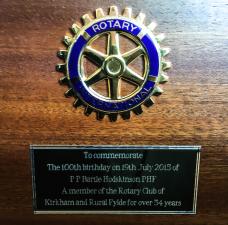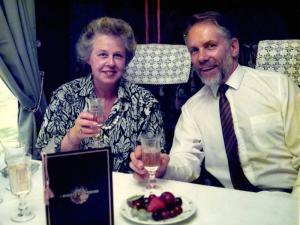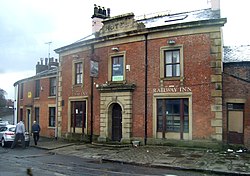About us
Kirkham and Rural Fylde Rotary Club.

The Rotary Club of Kirkham and Rural Fylde was formed in 1938, at which time Kirkham had a population of 3,500 and was primarily a cotton town with six mills. The Club title was chosen to recognise the ten rural parishes and the urban districts of Kirkham and Wesham. Since 1938 the population of Kirkham has more than doubled, there is no spinning or weaving and the sites have been adapted to other industrial uses or have been redeveloped for housing. However, the rural scene remains largely unchanged apart from the swathe of the M55 and the Toshiba nuclear engineering complex at Salwick. Kirkham is the largest town in the area with a history going back to Roman times. In 1296 the town received a Manor Charter.
Farmers have always been well represented in the Club as have trades and businesses. Headmasters of the local Kirkham Grammar School have all been members.
The world's first service club, the Rotary Club of Chicago, Illinois, USA, was formed on 23 February 1905 by Paul P. Harris, an attorney who wished to recapture in a professional club the same friendly spirit he had felt in the small towns of his youth. The name "Rotary" derived from the early practice of rotating meetings among members' offices.
Rotary's popularity spread throughout the United States in the decade that followed; clubs were chartered from San Francisco to New York. By 1921, Rotary clubs had been formed on six continents, and the organization adopted the name Rotary International a year later.
As Rotary grew, its mission expanded beyond serving the professional and social interests of club members. Rotarians began pooling their resources and contributing their talents to help serve communities in need.
Kirkham (originally Kirkam-in-Amounderness) is a small town and civil parish in the Borough of Fylde in Lancashire, England, midway between Blackpool and Preston (11 miles west of Preston) and adjacent to the smaller town of Wesham. It owes its existence to Carr Hill upon which it was built and which was the location of a Roman fort. It has a population of 7,127.
In his 1878 History of the Fylde of Lancashire, John Porter described Kirkham as ".. probably the earliest inhabited locality in the Fylde district." Remains found at Carleton in the 1970s of an elk with two harpoons embedded suggest that the Fylde was inhabited as long ago as 8,000 BC.
The town is pre-Roman in its origin with a name originating from the Danish kirk (church) and -ham (Saxon for settlement, or "home"). It appears in the Domesday Book of 1086 under the name of Chicheham and is described as lying on the Roman road between Ribchester(Bremetennacum) and the River Wyre. The town's market charter was granted in 126970 by King Henry III.
In the 15th and 16th centuries Kirkham remained a small market town. But from the late 17th century the town grew into a thriving textile centre. From 1830 sailcloth was being woven in cottages in the town and later at the Flax Mill, built in 1861 by John Birley.
In 1792 a Roman brass shield boss was discovered by local schoolmaster John Willacy, in the Dow Brook, in Mill Hill Field. Willacy sold the shield to a Scotsman but it found its way to the Charles Townley collection in Burnley and from there to the British Museum. The oval shield, about 8 inches (20 cm) in diameter, bore the representation of a human figure, seated, with an eagle to the left and an athlete at the side.
In 1887 a memorial was erected, at Town End, to commemorate the Golden Jubilee of Queen Victoria. The memorial was later moved to a site adjacent to the United Reformed Church.
Looms ran in the town from about 1850 until 2003. At one time the town had eleven mills, the last to be built being Progress Mill in 1915. On the lower part of Station Road "The Last Loom" of Kirkham is on permanent display. This loom, a crossrod type from the 1920s, with the use of tappets at the side, could produce an extensive range of fabrics including velvets, twills and Bedford cord.
In 1925 Church Street became the subject of a pencil on paper drawing by Salford artist L. S. Lowry In his later "A Lancashire Village, 1935" he painted the scene again, but with a wider street full of people and a house in front of the church.
The Church of England parish church is St Michael's whose minister is Reverend Rick Bunday. There is also a Roman Catholic church - St John The Evangelist, built in 1845, but known locally as "The Willows" - on the Ribby Road, a United Reformed Church on Poulton Street, a Methodist church on Nelson Street.
Zion (Independent) Chapel was founded in 1818. Although the church has long since been demolished, the graveyard remains. Now associated with Kirkham United Reformed Church, but adjacent to the Manse Nursing Home in the centre of the town, this unusual isolated burial-ground is still well maintained.
The small library, which the town has enjoyed since 1939, recently reopened following a major refurbishment.
The town is served by its own free newspaper, the Kirkham and Wesham Advertiser. Both the Blackpool Gazette and the Lancashire Evening Post cover Kirkham news, as does the weekly Kirkham and Fylde Express.[14] Regular bus services are provided by the Ribble branch of Stagecoach Buses and Coastal Coaches.
The town has been visited by a number of well-known authors who have performed book-signings at one of the town's two book shops. These have included Ranulph Fiennes, Michael Parkinson, Stacey Solomon, Michael Caine, Sarah Brown, Joanne Harris, The Wanted, Jacqueline Wilson, Jo Brand,Gervase Phinn, Al Murray, Terry Wogan, Katie Price, Jack Dee and many more. One of these shops, Silverdell, has been voted "Independent Bookshop of the Year (Northern)". The town has a number of garages, but no longer any petrol filling station.
Kirkham Club Day, an annual gala, is held in early June, jointly with Wesham. The day involves the various churches and their chosen "Rose Queens", together with biblical tableau floats, civic dignitaries and brass bands, walking in procession through the town in the morning. In 2013 Club Day was held on 8 June.
The town's War Memorial is located in a small memorial garden on Barnfield.
Kirkham Swimming Baths was erected in 1908 by the bequest of William Segar Hodgson J.P. and has served Kirkham as a public swimming pool for over a century. Open seven days a week, galas, free children swims and adult-only swims are regularly held. In February 2008 a campaign was initiated to save the baths from closure. This included a public march through Kirkham and Wesham on 1 March attended by some 3,000 local supporters. A local action group was subsequently formed to organise the longer term survival of the baths, and was successful in presenting a business plan to Fylde Borough Council. The baths, now run by the YMCA, has been re-branded as "Rural Splash".
The town's football club is A.F.C. Fylde. The club was known as Kirkham and Wesham F.C until the end of the 2007-08 season, and was formed by the amalgamation of Kirkham Town F.C. and Wesham F.C. The change of name to A.F.C. Fylde was made to try and encourage a broader fan-base from across the Fylde coast.
A.F.C. Fylde is currently based in the nearby village of Warton and plays in the Northern Premier League Premier Division. They won the FA Vase in the 2007-08 season, beating Lowestoft Town in the final at Wembley Stadium on 11 May 2008. They were also promoted to the North West Counties Football League Premier Division after finishing second in Division Two. In 2008-09 they were North West Counties Football League champions and so won promotion to the Northern Premier League Division One North. The team now have their own Headquarters and Club Shop on Station Road.
The Church of St Michael, Church Street is a Grade II* listed building.
There a number of Grade II listed buildings and structures:
-
14, Preston Street - bearing the date 1729, the initials H JE and above them the coat of arms of the London Curriers Company
-
4, Church Street
-
32, Preston Street
-
4 and 6, Freckleton Street
-
Church of St John the Evangelist, Ribby Road
-
Churchyard wall and gateway S of the Church of St John the Evangelist, Ribby Road
-
Fishstones and Lamp, 4 Church Street
-
Jubilee Lamp
-
Kirkham Grammar School (boarding house and eastern buildings only), Ribby Road
-
Kirkham United Reformed Church
-
Hillside and attached wings, 48, Preston Street
-
K6 telephone kiosk, 34, Poulton Street
-
Railway Hotel, 115 Station Road
-
Sundial, in Churchyard, c. 20m S of South porch of the Church of St Michael, 37, Church Street
-
Tomb of Edward and Dorothy King, in churchyard c. 50m SE of porch, School Lane
-
Tomb of Edward and Elizabeth Birley in churchyard c. 50m SE of porch, School Lane
-
Tomb of William Birley and Others in churchyard c. 50m SE of porch, School Lane
-
Trustee Savings Bank, Poulton Street

About us sub-pages:

Club Archive
more Your one stop shop for all things relating to Kirkham Rotary Club in years gone by. (1 page below this)
NEWSLETTER SPRING 2016
more The latest news from the Rotary club of Kirkham and rural Fylde.

Past Rotarians remembered
more Dedicated to past members of our club who have sadly passed. (3 pages below this)

PP BARTLE HODGKINSON PHF
more Our beloved member PP Bartle Hodgkinson reaches 100 not out.

The life of a Rotarian: PP Paul Leeson PHF.
more This month we focus on our member PP Paul Leeson PHF

The life of a Rotarian: PP Bartle Hodgkinson PHF.
more A new feature to the Kirkham and Rural Fylde Rotary Club, each month we will focus on one of our members and give a more detailed insight into their day to day work, achievements and life history.
Public Relations
more The Public Relations Committee has responsibility for membership communication including monthly bulletins, website, press releases, social media and the furtherment of Kirkham Rotary Club. (46 pages below this)
























